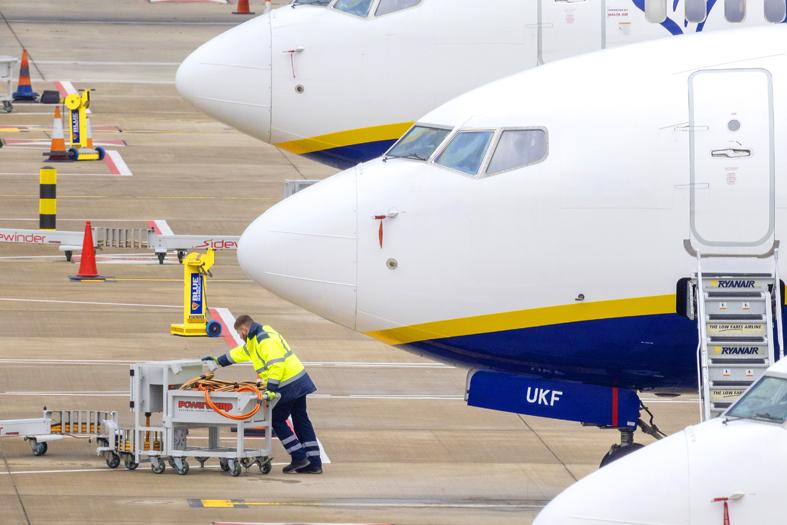Ryanair Holdings PLC took a cautious view on the pace of the travel rebound, saying it will cut prices to stimulate demand this quarter while more countries consider removing COVID-19 travel restrictions.
Though bookings are improving, most are still last-minute, and investors should expect further disruption before Europe is through the pandemic, the region’s biggest discount airline said yesterday. The Irish company said it is in “growth mode,” but that the timing of the recovery remains unpredictable.
“It’s correct to be cautious for the remainder of this financial year as there may be another twist in COVID,” chief financial officer Neil Sorahan said in an interview. “It has taken us by surprise a couple of times. But we’re well placed to capitalize on the massive opportunities that exist.”

Photo: Bloomberg
Ryanair has set plans for an aggressive expansion as travel returns, with 720 new routes and 15 new bases announced for the fiscal year beginning in April.
The company posted a 96 million euro (US$107 million) loss for the December quarter after analysts had predicted a smaller deficit, and stuck with the more negative forecast for the year through March that it issued last month as the Omicron variant of SARS-CoV-2 wiped out the Christmas and New Year travel peak.
Ryanair said it is hopeful that EU nations will follow the British lead in scrapping testing for vaccinated travelers in time to restore consumer confidence well in advance of Easter, which falls in April.
Sorahan told Bloomberg Television that he is seeing progress toward relaxed rules in Germany, Italy and Austria.
He said that currently low ticket prices may strengthen once the rebound gets going, given the amount of capacity that has exited the market during the crisis, making for “a relatively good summer.”
Dublin-based Ryanair said it has taken delivery of 41 new Boeing Co 737 MAX jets with plans to add another 24 in time for summer, helping it to offer 14 percent more seating than in the peak period of 2019.
The carrier reiterated that it is targeting an increase in passengers to 225 million a year by 2026 and said it now expects to create 6,000 more jobs over that period, up from 5,000 previously.
Ryanair will also work over the next two years to pare net debt that has risen to more than 2 billion euros. Bonds maturing next year and in 2024 will be repaid at least partly through the company’s own cash generation, Sorahan said.

‘SWASTICAR’: Tesla CEO Elon Musk’s close association with Donald Trump has prompted opponents to brand him a ‘Nazi’ and resulted in a dramatic drop in sales Demonstrators descended on Tesla Inc dealerships across the US, and in Europe and Canada on Saturday to protest company chief Elon Musk, who has amassed extraordinary power as a top adviser to US President Donald Trump. Waving signs with messages such as “Musk is stealing our money” and “Reclaim our country,” the protests largely took place peacefully following fiery episodes of vandalism on Tesla vehicles, dealerships and other facilities in recent weeks that US officials have denounced as terrorism. Hundreds rallied on Saturday outside the Tesla dealership in Manhattan. Some blasted Musk, the world’s richest man, while others demanded the shuttering of his

TIGHT-LIPPED: UMC said it had no merger plans at the moment, after Nikkei Asia reported that the firm and GlobalFoundries were considering restarting merger talks United Microelectronics Corp (UMC, 聯電), the world’s No. 4 contract chipmaker, yesterday launched a new US$5 billion 12-inch chip factory in Singapore as part of its latest effort to diversify its manufacturing footprint amid growing geopolitical risks. The new factory, adjacent to UMC’s existing Singapore fab in the Pasir Res Wafer Fab Park, is scheduled to enter volume production next year, utilizing mature 22-nanometer and 28-nanometer process technologies, UMC said in a statement. The company plans to invest US$5 billion during the first phase of the new fab, which would have an installed capacity of 30,000 12-inch wafers per month, it said. The

MULTIFACETED: A task force has analyzed possible scenarios and created responses to assist domestic industries in dealing with US tariffs, the economics minister said The Executive Yuan is tomorrow to announce countermeasures to US President Donald Trump’s planned reciprocal tariffs, although the details of the plan would not be made public until Monday next week, Minister of Economic Affairs J.W. Kuo (郭智輝) said yesterday. The Cabinet established an economic and trade task force in November last year to deal with US trade and tariff related issues, Kuo told reporters outside the legislature in Taipei. The task force has been analyzing and evaluating all kinds of scenarios to identify suitable responses and determine how best to assist domestic industries in managing the effects of Trump’s tariffs, he

Taiwan’s official purchasing managers’ index (PMI) last month rose 0.2 percentage points to 54.2, in a second consecutive month of expansion, thanks to front-loading demand intended to avoid potential US tariff hikes, the Chung-Hua Institution for Economic Research (CIER, 中華經濟研究院) said yesterday. While short-term demand appeared robust, uncertainties rose due to US President Donald Trump’s unpredictable trade policy, CIER president Lien Hsien-ming (連賢明) told a news conference in Taipei. Taiwan’s economy this year would be characterized by high-level fluctuations and the volatility would be wilder than most expect, Lien said Demand for electronics, particularly semiconductors, continues to benefit from US technology giants’ effort